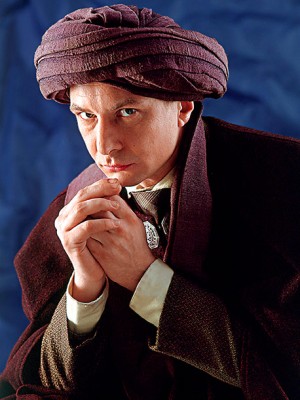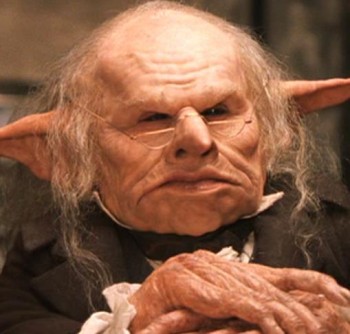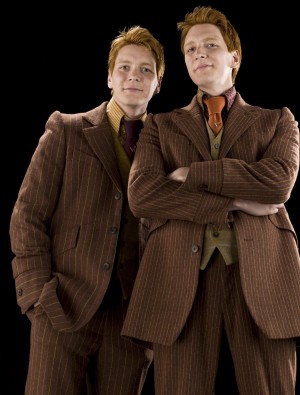*Warning: Spoilers for all seven Harry Potter books and movies follow. If you haven’t read the complete series, step away from the computer. Also, did you have a childhood?
On Monday I talked about some major failings in the wizarding educational system. Today I’m going to discuss another huge absurdity in the Harry Potter universe that I only considered as an adult. Namely…
2. Cultural Xenophobia and Market Blindness

I mean, no one thought this turban
was questionable headgear…
First, I’m going to go out on a limb here and assume that witches and wizards are a global minority. Considering the fact that Hogwarts is the only wizarding school in all of Britain, and every magical child is obliged to attend, and all the wizarding families all know one another…yeah, definitely a global minority. Now let’s take a look at the wizarding community’s relationship with the Muggle world. That’s right–they don’t have one. Witches and wizards actively eschew any dealings with the Muggle world, and when a witch or wizard (like Arthur Weasley) shows any interest in the technology or culture of Muggles he is assumed to be a bit mental and generally shunned. And that’s the best case scenario.
And when forced to go out and interact with the Muggle world, witches and wizards seemingly take great pains to dress like idiots. The Minister of Magic himself, who is the only prominent magical personage to have any official dealings with the Muggle world, is described as wearing a pinstriped suit, scarlet tie, long black travelling cloak, pointed purple boots, and lime green bowler hat. Lime green bowler hat? Really? Where would one even acquire such a thing? It seems to be a badge of pride in the wizarding world to have absolutely no clue about Muggle customs or culture, and behave as though Muggles don’t exist, despite the fact that they outnumber the wizarding community a thousand to one.

This little guy is in charge of all the moniez. All of them.
Second, let’s consider wizarding economics. I have one word for you: goblins. Goblins run Gringotts, which is the only bank in the wizarding world; therefore, goblins control the wizarding economy. And Gringotts serves only one apparent function: storing money. Wizards seem to have no concept of economics beyond saving the money they’ve already made. There is no mention of a wizarding stock market, or even a system of loans and credit, nor does there appear to be any industry, manufacturing, or agriculture in the wizarding world. Not to mention the fact that the wizarding currency is extremely rudimentary, with coins minted out of actual precious metals and no paper money. How Harry’s parents came to possess such great piles of gold is somewhat mystifying; if defying Voldemort paid so well, I’m surprised more people didn’t do it.

I nominate these two entrepreneurs to lead
the charge. Maybe in different suits though…
So, on top of being extremely dismissive of Muggle global hegemony the wizarding world has no concept of economics. And to that I say: big mistake! A synthesis of wizard magic and Muggle technology could lead to great things, the least of which would be making every witch and wizard in Britain fabulously wealthy. The wizarding world is missing out on a huge market with Muggles. Think about it: wizards have a monopoly on magic, so any addition of magic to the Muggle lifestyle would equal Galleons in pockets. Everything from technology to healthcare to science could be revolutionized by the addition of wizarding ability and knowledge. Pepperup Potions, Ten-Second Pimple Vanishers, Pygmy Puffs–what Muggle wouldn’t want them? Enterprising witches and wizards could be getting filthy rich while advancing human progress.
But no. They’d rather prance around in lime-green bowler hats and pointy-toed purple boots, feeling superior while their outdated fiscal policies bankrupt the wizarding world one misused Galleon at a time. Way to go, wizards.
Stay tuned for Friday’s third and final instalment of Harry Potter and the Illiterate Wizards!
“How Harry’s parents came to possess such great piles of gold is somewhat mystifying”
I think Rowling subsequently wrote something about that:
https://www.pottermore.com/writing-by-jk-rowling/the-potter-family
I think the wizarding world is made up primarily of old families, who have amassed wealth through time. There may be a system of loans, but as for stocks and more complex products – derivatives, bonds – we can safely assume there are none. I dislike that the world’s economy can be brought down by things like sub-prime mortgage crises, because anything can be sold in the financial market…trade receivables, contracts… May be it’s not a bad thing that wizarding currency is based on actual gold and silver, rather than imaginary wealth.
I think the synthesis of wizard magic and Muggle technology is prevented by the International Statute of Wizarding Secrecy. It makes sense they decided to forego potential wealth for security, considering that prominent members of the wizarding societies are probably from one of those old wealthy families.
Hi Aria! Yes, you’re absolutely right about all of this. This post was written with my tongue firmly planted in my cheek, and was only meant to poke a little fun at some of the holes in Rowling’s world-building (especially in the early books). In the years since the original series was released the world has certainly expanded with ancillary stories which have helped flesh out some of these original ideas. It’s also worth mentioning that the stories are written from Harry’s perspective, who was raised by muggles and doesn’t see much of the world beyond Hogwarts in the first few books! It makes sense that he wouldn’t know much about wizarding economics as an 11 year old 🙂 Thanks for commenting!